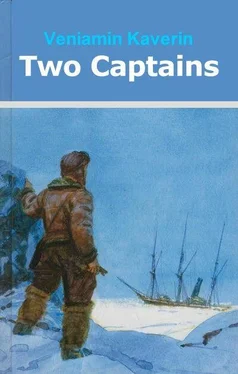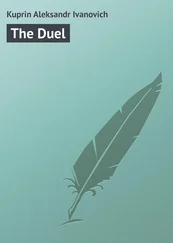"To those at sea!" was the second toast. Glasses clinked. The sailors drank, standing, to their comrades who were braving the perils of the Arctic night in the watery wastes. To good luck in battle and a steady heart in the hour of danger and decision.
Now the admiral was looking at me across the table-1 was sitting on his right, among the journalist guests, to whom F. was demonstrating with the aid of knife and fork how the torpedo boat was sunk. His eyes on me all the time, the admiral said something to his neighbour, and the latter, the flotilla commander, got up to propose a third toast. "Here's to Captain Grigoriev, who skilfully vectored the submarine onto the German convoy." And the admiral made a gesture to show that he was drinking to me.
I shall not list all the toasts that were proposed, especially as the journalists I have mentioned told the story of the "three roast-pigs" in the press. I shall merely mention that the admiral disappeared quite unexpectedly-he suddenly got up and went out. In passing my chair he leaned over, and without letting me get up, said quietly: "Please come and see me today, Captain."
Chapter Four
RANGING WIDE
The machine took off, and within a few minutes that hash of rain and mist, which we thought nothing of on the ground, became an important part of the flight, which, like all flights, consisted of (a) the mission, and (b) everything that hindered the execution of the mission.
We made a flat turn, banking slightly, and swung round onto our course.
Our mission, then, or, as the admiral called it, "special assignment" was this: A German raider (evidently an auxiliary cruiser) had passed into the Kara Sea and shelled the port of T. and was now lurking somewhere far in the East. I was to hunt her down and sink her, the sooner the better, as a convoy of ours with a cargo of war materials was on its way through the Northern Sea Route and was now fairly close to this port. It was not difficult to imagine what havoc a big warship could cause in these peaceful waters.
I pulled up to five and a half thousand metres. But here, too, there was nothing but the same dreary cloud hash, which the Almighty himself seemed to be stirring up thick with a gigantic spoon.
So I had to find her and sink her. Doing the first was far and away the more difficult of the two. How astonished the admiral had been when I corrected almost all the islands of the eastern part of the Nordenskjold Archipelago on his chart. "Have you been there?" "No."
He did not know that I had been there yet not been there. The map of the Nordenskjold Archipelago had been corrected shortly before the war by the Nord expedition. I had not been there. But Captain Tatarinov had, and mentally I had followed in his wake a thousand times.
Indeed, nothing in life is done in vain. Life turns this way and that, plunges down, forcing its way like an underground river in the darkness and silence of eternal night, and suddenly emerges into the open, into the sunshine and light of day, just as my machine now has emerged from the welter of clouds. Aye, nothing in life is done in vain.
Always uppermost in my mind was the thought of what my life would have been in the North if I had found Katya and we had been living together at N.
She would wake up when, at three in the morning, I came home before setting out on a flight. She would be rosy, warm and sleepy. Perhaps, on coming in, I would kiss her in a way that would somehow be different, and she would understand at once how important and interesting was the task which the admiral had entrusted me with.
I had seen this a thousand times, but would it ever be like that again?
"Navigator, bearings!"
The pilot's course and the navigator's were three degrees out, but coincided to a T when cigarette-cases, pocket torches and lighters were turned out of pockets,
What had I been thinking about? About Katya. About the fact that I was flying to places where we had once planned to go together and from which I had been kept away for so long. Had I not known for certain, beyond doubt, that the time would come when I should be flying in these parts? Had I not charted to within half a degree the route which, as in a child's dazzling dream, the men from the St. Maria had trudged, breathing heavily, with eyes shut against the blinding glare? And in the lead, a big man, a giant in fur boots.
But this was romancing. I drove the thought away. Novaya Zemlya was close at hand.
You would be bored if I started telling in detail how we hunted that surface raider. To detect a camouflaged warship, a barely visible streak amid the boundless wastes of the Arctic seas, was no easy task. We flew from base to base for over a fortnight. One of the flights lasted seven hours. After scouring the Kara Sea in both directions we returned to Novaya Zemlya, but could not find it. It was as though these great islands had up till now been marked on the map by mistake. While the fuel lasted we flew around over the place in the black fog, and if the wind had not, to our good fortune, torn a small bright hole in the fog, I should probably not have been able to finish this book. We made for this gap, and landed safely with the engine cut off.
Altogether it was a hard fortnight we spent on Novaya Zemlya. Every time we started out in the hope of finding the raider, though it had been plain to me for some time that we ought to be seeking it much farther East. We scoured the sea until fuel gave out and the navigator inquired phlegmatically: "Home?"
And "home" would unfold to our gaze-rugged, tumbling mountains, blue glaciers split lengthways, as it were, and ready to slide down into the bottomless snowy gorges.
Then came the moment when our stay on Novaya Zemlya end-ed-a wonderful moment, which is worth going into in somewhat greater detail.
I was standing outside a storehouse the roof of which was covered with birds' carcasses and on its walls were stretched the skins of seals. Two little Nentsi, looking like penguins in their fur garments with blind sleeves, were playing on the beach and I was chatting with their parents-a little girl of a mother and a father of similar stature with a brown head sticking out of his anorak. We were discussing international affairs, I remember, and although the analysis of Germany's hopeless position which I was giving them had been taken from a very old back number of Pravda, the Nenets was going to pass it on that same day to a friend of his who lived quite near-a mere two hundred kilometres away. His little wife, who was quite at sea in politics, nodded her shiny black head with its pudding-basin haircut and kept saying: "Velly good, velly good."
"Would you like to go to the front?" I asked the man.
"I like, I like."
"Aren't you afraid?"
"Why afraid, why?"
That was the moment when I saw my navigator running towards me-not just walking, but running along the shore from the point of land on which our plane stood.
"We're being assigned to a new base."
"Where?"
"To Zapolarie."
He had said "to Zapolarie", and though there was nothing impossible about our being reassigned to Zapolarie, that is, to the very area where I thought the raider had to be sought, I was flabbergasted. Why, this was my own Zapolarie.
"It can't be."
The navigator had reassumed his old imperturbable, unhurried manner.
"Shall I check it?"
"No need."
"When do we take off?"
"In twenty minutes."
Chapter Five
BACK AT ZAPOLARIE
It was some time before I found Doctor Pavlov's street, for the simple reason that in my day this street had had only one house standing in it-the doctor's, all the others existing only on the plan that hung in the office of the District Executive Committee. Now the little house in which I had once spent my evenings poring over the diaries of Navigating Officer Klimov was lost amid its tall neighbours. What pleasant, youthful evenings those had been! Those creaking floor-boards in the next room under the light tread of Volodya. Mrs Pavlova coming in-large, determined, open-hearted-and setting before me in silence a plate with a huge piece of pie.
Читать дальше












